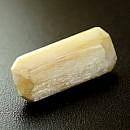|
|
||||||||||||||||
|
||||||||||||||||
|
||||||
|
|
|
|
Laumontite
|
|
| | |
| Discovered in 1805; IMA status: Valid (pre-IMA; Grandfathered) | ||
|
| ||
|
Chemistry |
|
|
| |
|
CaAl2Si4O12 • 4(H2O) | |
|
|
Hydrated Calcium Aluminum Silicate |
|
Molecular Weight: |
470.44 gm |
|
Composition: |
Calcium |
8.52 % |
Ca |
11.92 % |
CaO |
|
|
Aluminum |
11.47 % |
Al |
21.67 % |
Al2O3 |
|
|
Silicon |
23.88 % |
Si |
51.09 % |
SiO2 |
|
|
Hydrogen |
1.71 % |
H |
15.32 % |
H2O |
|
|
Oxygen |
54.42 % |
O |
|
|
|
|
|
100.00 % |
|
100.00 % |
= TOTAL OXIDE |
|
|
|
||||
|
Classification |
|
|
| |
|
Silicates (Germanates) | |
|
8/J.22-50 | |
|
|
9 : SILICATES (Germanates)
|
|
Related to: |
Zeolite Group. Laumontite Subgroup. |
|
Members of Group: |
Zeolite Group: Alflarsenite, Amicite, Ammonioleucite, Analcime, Barrerite, Beaumontite (of Lévy), Bellbergite, Bikitaite, Boggsite, Brewsterite, Chabazite, Chabazite-Lévyne Subgroup, Chiavennite, Clinoptilolite, Cowlesite, Dachiardite, Direnzoite, Edingtonite, Epistilbite, Erionite, Faujasite Subgroup, Ferrierite, Ferrochiavennite, Flörkeite, Garronite, Gaultite, Gismondine, Gmelinite, Gobbinsite, Gonnardite, Goosecreekite, Gottardite, Harmotome, Heulandite, Hsianghualite, Kirchhoffite, Laumontite, Leucite, Lévyne, Lovdarite, Maricopaite, Mazzite, Merlinoite, Montesommaite, Mordenite, Mutinaite, Nabesite, Natrolite, Offretite, Pahasapaite, Paranatrolite, Parthéite, Paulingite, Perlialite, Phillipsite, Pollucite, Roggianite, Scolecite, Stellerite, Stilbite, Strontiohurlbutite, Terranovaite, Thomsonite, Tschernichite, Tschörtnerite, Wairakite, Weinebeneite, Wenkite, Willhendersonite, Yugawaralite |
|
Varieties: |
Caporcianite, Leonhardite, Vanadio-laumontite |
|
Synonyms: |
Aedelforsite, ICSD 72914, Laumonite, Lomonite, PDF 45-1325, Schneiderite |
|
|
|
|
Crystal Data |
|
|
|
|
|
Crystals square prisms with steep oblique terminations, stout, commonly elongated, to 20 cm. Radiating, columnar, fibrous; in interlocking aggregates, massive. |
|
|
On {100}, typically with terminal re-entrants. |
|
|
|
|
|
Physical Properties |
|
|
|
|
|
Perfect on {010}, {110} |
|
|
Irregular/Uneven |
|
|
Brittle |
|
|
3.0 - 4.0 |
|
|
2.23 - 2.41 (g/cm3) |
|
|
Fluorescent; weak white under SW and LW UV |
|
|
Not Radioactive |
|
|
Other: |
Undergoes a partial loss of H2O on exposure to air. |
|
|
|
|
Optical Properties |
|
|
|
|
|
White to gray, pink, yellowish, brownish, golden brown; colorless in thin section. |
|
|
Transparent to translucent |
|
|
Vitreous to pearly on cleavages |
|
|
1.502 - 1.526 Biaxial ( - ) |
|
|
0.007 - 0.012 |
|
|
Distinct; r < v; weakly inclined. |
|
|
None |
|
|
|
|
|
Occurances |
|
|
|
|
|
Geological Setting: |
Of hydrothermal origin, lining cavities in igneous rocks. Thick sedimentary beds rich in laumontite may form by decomposition of analcime or metamorphism of plagioclase. May be authigenic, cementing sandstones. |
|
Common Associations: |
Zeolites, Apophyllite, Datolite, Calcite, Chlorite |
|
Common Impurities: |
Na, K, Fe |
|
Type Locality: |
Huelgoat (Locmaria-Berrien), Finistère, Brittany, France |
|
Year Discovered: |
1805 |
|
View mineral photos: | |
|
|
|
|
More Information |
|
|
|
|
|
| |
|
|
|
|
Leonhardite was named by Johann Reinhard Blum (1802-1883) in 1843 in honor of Karl Ritter von Caesar Leonhard (1779-1862). Von Leonard was a tax assessor and administrator of the Grand Duchy of Frankfurt, and eventually, he became Professor of mineralogy at the University of Heidelberg, Germany. Laumontite was originally named Laumonite (missing a "t") in 1805 by Abraham Gottlieb Werner (1749-1817) in honor of François Pierre Nicolas Gillet Laumont (1747-1834), Inspector General of Mines, who discovered the mineral. The name was changed to its current spelling, Laumontite, in 1821 by Karl Ritter von Caesar Leonhard. Laumont's birth name was François Pierre Nicolas Gillet. He took on the name "of Laumont" to distinguish himself from his older brother François Pierre Gillet of Renommière (1734-1813). Perhaps the mineral should have been named Gilletite. Laumontite
distribution: relatively
common. Well-crystallized specimens: from Huelgoat,
Finistμere, France. From Sãcãrâmb (Nagyág),
Romania. At St. Gotthard, Ticino, Switzerland. From
Floitental, Zillertal, and other places in Tirol, Austria.
In Italy, from Baveno, Piedmont. From Poona and in the
Khandivali quarry, near Bombay, Maharashtra, India,
large crystals. In the USA, exceptional crystals from
the Pine Creek tungsten mine, Bishop, Inyo County, California;
from Drain, Douglas County, Oregon; at Bergen Hill,
Hudson County, and Paterson, Passaic County, New Jersey;
in the Goose Creek quarry, Leesburg, Loudoun County,
Virginia; on the Keweenaw Peninsula, Houghton and Keweenaw
Counties., Michigan. |
|
|
We
have not photographed our Laumontite
gems yet. Please
check back soon. |
